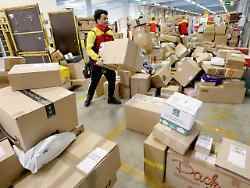German Returns European Champion
Every fourth online order is returned
09/07/2022, 05:12 am
In no other country in Europe are so many goods ordered online sent back to the retailer as in Germany. This is also due to the fact that local online retailers are much more generous with returns than in other countries, as a study has found. Only a tiny part of this product ends up in the garbage.
Last year, people in Germany ordered goods worth 99 billion euros on the Internet – and immediately sent back every fourth package, complete or with part of the goods. Economists from the University of Bamberg determined this. An estimated 530 million packages with 1.3 billion items were returned to retailers. This means that Germany is the “European Returns Champion”, the researchers said.
One of the reasons: In Germany, returns are usually free of charge. Only one in ten German online retailers ask for fees or cost sharing, compared to every second in other European countries, said the head of the returns management research group, Björn Asdecker. A second reason is the generous return periods: On average, retailers in Germany allow significantly more time than in the rest of the EU to return an item. And finally, the Germans also order far more on account than the other Europeans. This makes a return easier than with delivery by cash on delivery, direct debit or prepayment.
Of the 1.3 billion items returned, 91 percent are clothing or shoes. “The average transport and processing costs per return shipment are EUR 6.95,” said Asdecker. Small traders would have significantly higher costs than large ones. After all, only one percent of the returned items end up in the trash at the retailer. More than 93 percent can be immediately resold as new. The rest is offered as second-hand goods, sold to industrial users or donated.
“German e-commerce retailers are particularly good at recycling their returns. The proportion of disposal in Germany is lower than in the rest of Europe,” said Asdecker. The costs per return are lower than with the competition. “This results in a competitive advantage for German e-commerce.”
“Taking back goods is part of consumer protection”
In any case, the returns put a strain on the climate. According to the research group, “an estimated 795,000 tons of CO2 are due to returns in Germany in 2021” – that’s about as much as 6.6 million cars emit on the journey from Munich to Hamburg. However, as the survey shows, their ecological footprint is not that important to the industry: “Less than five percent stated that their company measures the carbon footprint of returns.”
For the study, the experts interviewed 411 managers of European retailers with a total online turnover of around 60 billion euros and evaluated data from the associations for e-commerce, mail order, parcel services and express logistics.
“The return of goods is part of consumer protection and is part of well-established processes in online and mail order business,” said the deputy general manager of the Federal Association of E-Commerce and Mail Order, Martin Groß-Albenhausen. “All the more important is research into the reasons for returns, the scope, avoidability and utilization of returns, but also into specific returns behavior.” For the fall, the association announced a returns compendium with study results from Asdecker, Darmstadt Professor Bernd Jörs, the EHI Retail Institute and others.
